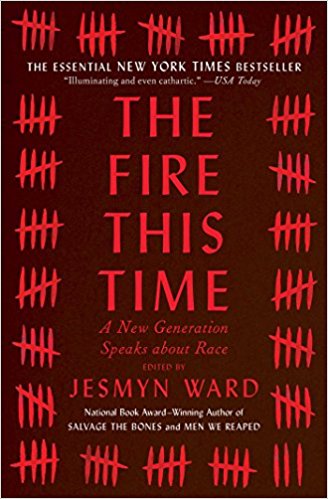 The Fire This Time: A New Generation Speaks about Race by Jesmyn Ward
The Fire This Time: A New Generation Speaks about Race by Jesmyn Ward Published by Scribner on June 20th 2017
Genres: Nonfiction
Pages: 240
Buy on Amazon
Goodreads

A surprise New York Times bestseller, these groundbreaking essays and poems about race—collected by National Book Award-winner Jesmyn Ward and written by the most important voices of her generation—are “thoughtful, searing, and at times, hopeful. The Fire This Time is vivid proof that words are important, because of their power to both cleanse and to clarify” (USA TODAY).
In this bestselling, widely lauded collection, Jesmyn Ward gathers our most original thinkers and writers to speak on contemporary racism and race, including Carol Anderson, Jericho Brown, Edwidge Danticat, Kevin Young, Claudia Rankine, and Honoree Jeffers. “An absolutely indispensable anthology” (Booklist, starred review), The Fire This Time shines a light on the darkest corners of our history, wrestles with our current predicament, and imagines a better future.
Envisioned as a response to The Fire Next Time, James Baldwin’s groundbreaking 1963 essay collection, these contemporary writers reflect on the past, present, and future of race in America. We’ve made significant progress in the fifty-odd years since Baldwin’s essays were published, but America is a long and painful distance away from a “post-racial society”—a truth we must confront if we are to continue to work towards change. Baldwin’s “fire next time” is now upon us, and it needs to be talked about; The Fire This Time “seeks to place the shock of our own times into historical context and, most importantly, to move these times forward” (Vogue).
I have had this book on my to-read list for a while, but I wanted to read James Baldwin’s The Fire Next Time first, thinking if the books were in dialogue with one another, it would be a good idea to read the conversation starter first. I’m so glad I read both of these books and so many other books in the closing weeks of this year. I am learning so much, and my eyes are opening up to a reality that has always run parallel to my existence, but which I never understood because it wasn’t my experience. I have had to contend with my own racism, and I’d like to think I have overcome it, but I know that I am a work in progress. At least I am trying to listen, though that’s not much and certainly isn’t enough.
As an educator, this reading has been essential to me because I see all how schooling is a social justice problem, and I have been a part of that problem. I’d like to be part of the solution going forward. I have ideas about how we might resolve some of the social justices issues inherent in our educational system.
This collection of essays pivots around the Black Lives Matter movement and two refrains run through many of the essays: Michael Brown’s murder in Ferguson, MO, and the murders of Cynthia Marie Graham Hurd, Susie Jackson, Ethel Lee Lance, Depayne Middleton-Doctor, Clementa C. Pinckney, Tywanza Sanders, Daniel Simmons, Sharonda Coleman-Singleton, and Myra Thompson at the Emanuel AME Church in Charleston, SC. In a particularly searing paragraph, contributor Daniel José Older says,
[T]he simple, resonating demand that black lives matter laid bare the twin lies of American equality and execeptionalism. Even on the left, even in this age of exposed racial rifts, politicians still say with a straight face that this country was founded on principles of equality. Words mean things, we say again and again, but actions mean much more, and still as a nation, we worship the very slave owners who gave legal precedence to the notion of percentages of human beings. We scream equality and freedom while unabashedly modeling our actions on the fathers of genocide. (200-201)
And this is the crux, to me, of what this book examines in contributions from luminaries such as Claudia Rankine, Edwidge Danticat, Clint Smith, Isabel Wilkerson, among many others. In some ways, it finds a partner in Ta-Nehisi Coates’s latest book, We Were Eight Years in Power. Both collections, as well as James Baldwin’s book, as America to hold a mirror up to its face and honestly examine what it sees. We just don’t want to do it. I suppose I am taking a hard look at America because I’m trying to figure out what went wrong. I think I have a deeper understanding of why we are in the political predicament in which we currently find ourselves. Making sense of it doesn’t make me feel better in any way. If anything, I feel worse. But I don’t know if I am yet hopeless. Maybe I am. Confronting these hard truths about who we are is not something the majority of Americans seem willing to do, but I hope people s in this collection, so it’s hard to pull out particular favorites. If I skim through the book, I noticed that I highlighted the contributions of Rachel Kaadzi Ghansah, Wendy S. Walters, Carol Anderson, Kevin Young, Kiese Laymon, Garnette Cadogan, Claudia Rankine, Emily Raboteau, Daniel José Older, and Edwidge Danticat. My own city of Worcester plays a role in Honorée Fanonne Jeffers’s essay “‘Dear Pledges of Our Love’: A Defense of Phillis Wheatley’s Husband.” Jeffers traveled to the American Antiquarian Society, located in Worcester, to research Wheatley. It’s shocking how little we know for certain about Wheatley, and it’s perhaps even more shocking we have probably relied on an erroneous source for what we do know. You will definitely learn something if you pick up this book, but my hunch is you’ll learn a great deal.